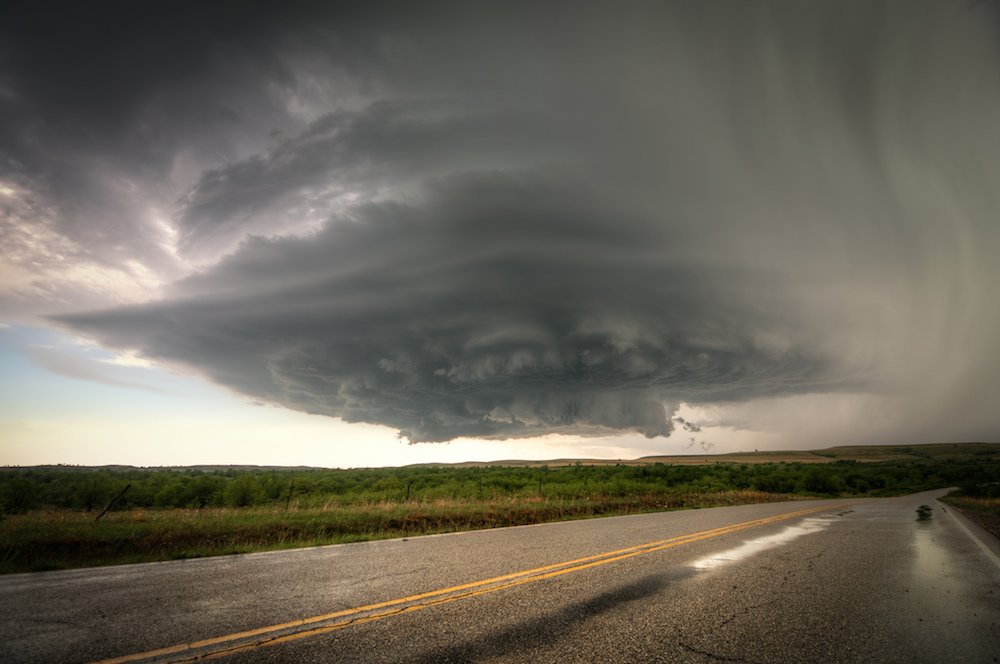U.S. Faces Heavier Summer Rains and Higher Risks of Flooding, Study Shows
Thunderstorms already cost the U.S. around $20 billion a year in flash floods, landslides, debris flows, high winds and hail. A thunderstorm passing over a windfarm south of Beaumont, Kan. (Lane Pearman / CC 2.0)
A thunderstorm passing over a windfarm south of Beaumont, Kan. (Lane Pearman / CC 2.0)
For the U.S., harder rain is on the way: America’s summer thunderstorms are about to get stormier. Later this century, the notorious mesoscale convective storms of middle America will not just darken U.S. skies: they will dump as much as 80% more water on the farms, highways and cities of the 48 contiguous states, a new study shows.
Mesoscale thunderstorms cover an area of around 100 kilometres: these have been on the increase, both in frequency and intensity, in the last 35 years and new research suggests that, as the world warms, their frequency could triple.
“The combination of more intense rainfall and the spreading of heavy rainfall over larger areas means that we will face a higher flood risk than previously predicted,” said Andreas Prein, of the National Centre for Atmospheric Research in the U.S., who led the study.
“If a whole catchment area gets hammered by high rain rates, that creates a much more serious situation than a thunderstorm dropping intense rain over parts of the catchment. This implies that the flood guidelines which are used in planning and building infrastructure are probably too conservative.”
Thunderstorms already cost the U.S. around $20bn a year in flash floods, landslides, debris flows, high winds and hail. Dr. Prein and his colleagues report in Nature Climate Change that what they call “observed extreme daily precipitation” increased in all parts of the U.S. from 1958 to 2012: that is because rising temperatures mean more evaporation, and at the same time a greater atmospheric capacity for moisture.
U.S. President Donald Trump has made it clear that he doesn’t believe in global warming and has promised to withdraw the U.S. from the global climate pact agreed by 197 nations in Paris in 2015.
But research, much of it from U.S. government agencies, suggests that climate change is happening anyway, and that US cities are at risk. The latest computer simulations suggest that the number of extreme summer storms in some parts of the U.S. could have increased fivefold by the century’s end.
Even the eastern seaboard could be hit: intense storms over an area the size of New York City could drop 60% more rain than the heaviest now. And this could add up to six times the annual discharge of the Hudson River.
The finding should come as no great surprise. Climate scientists have repeatedly warned that climate change, driven by global warming as a consequence of the profligate combustion of fossil fuels that dump ever greater levels of greenhouse gases in the atmosphere, could bring ever greater extremes of heat and rain.
Recent research has predicted that the kind of rainfall delivered by Hurricane Harvey over Houston in Texas could become much more frequent, and Atlantic communities are more likely to be pounded by hurricanes and superstorms.
Other long-term studies have predicted that coastal flooding could create a new class of climate refugees, within America itself. The latest study is a reminder that civic authorities, and the administration itself, need to prepare.
“This is a warning signal that says the floods of the future are likely to be much greater than what our current infrastructure is designed for,” Dr. Prein said.
“If you have a slow-moving storm system that aligns over a densely populated area, the result can be devastating, as could be seen in the impact of Hurricane Harvey on Houston.”
Your support matters…Independent journalism is under threat and overshadowed by heavily funded mainstream media.
You can help level the playing field. Become a member.
Your tax-deductible contribution keeps us digging beneath the headlines to give you thought-provoking, investigative reporting and analysis that unearths what's really happening- without compromise.
Give today to support our courageous, independent journalists.






You need to be a supporter to comment.
There are currently no responses to this article.
Be the first to respond.